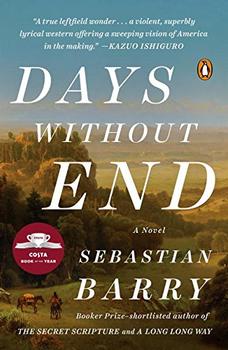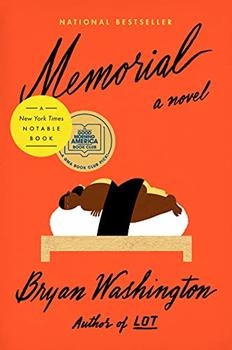Summary | Excerpt | Reviews | Beyond the book | Read-Alikes | Genres & Themes | Author Bio

Irish author Sebastian Barry has written multiple novels about the McNulty clan of Sligo, Ireland, inspired by the lives of his ancestors. When I heard that Days Without End (which was named the 2016 Costa Book of the Year), takes place in nineteenth-century America, I worried he wouldn't be able to bring a different setting to life. Fortunately, I was wrong. An entirely believable look at the life of the American soldier in the 1850s and 1860s, this novel succeeds due in part to its folksy dialect and a perfect balance between adventuresome spirit and repulsion at wartime carnage.
The narrator is Thomas McNulty, who snuck onto a ship to Canada after his family died during Ireland's potato famine. By age 17 he pitches up in Daggsville, Missouri, where he meets the man who will become his lover and lifelong friend, John Cole, and together they volunteer for the Army. "We were two wood-shavings of humanity in a rough world," Thomas, now an older man looking back on his eventful youth, writes. He paints himself and John as innocents, whereas at that time an outsider might have considered them degenerates.
For instance, while they await their first deployment, they take a job dancing in drag at a saloon for two years. At various points in the novel, Thomas dresses in women's clothing for entertainment or disguise. During the American-Indian Wars they also encounter Native American braves who regularly cross-dress, a practice called berdache or winkte (see 'Beyond the Book'). On periods of leave, Thomas and John rent a property where they live with their adopted daughter like a conventional family. I think readers will cheer at how Barry allows this relationship to seem ordinary rather than transgressive.
In some respects, then, the book is a lighthearted picaresque, but it is also a frank and sobering account of violent conflict. At the American soldiers' first engagement in California, they massacre an encampment of Yurok people, so caught up in bloodlust they hardly notice their victims are all women and children. This becomes a pattern: slaughtering or being slaughtered, burying the dead, and then setting off to take revenge on "enemies," such as the Sioux warrior Caught-His-Horse-First. Later, as Union soldiers, Thomas and John endure a ghastly battle in Virginia, are held prisoner in Georgia, and see a row of lynched blacks while traveling to Tennessee.
The curious mixture of tones – both cheerful and grave – works for a few reasons. One is Thomas's straightforward narration: Whether revealing that he and John sleep together, or describing war crimes, his manner is always blunt and unabashed. He's simply describing things as they are. Also, Thomas doesn't shy away from contradictions; he recognizes that conscience versus duty and sympathy versus hatred for the enemy are opposite pulls operating at the same time. And finally, his tragic past puts the atrocities he's witnessing into perspective to an extent, and also encourages him to seize happiness whenever he can.
While this novel shares some elements with Westerns and Civil War fiction, it's unique in several ways. Though thrilling and episodic, it's deeply thoughtful as well. Thomas writes semi-literate English – his punctuation and grammar are non-standard, and many sentences are incomplete – but delivers profound, beautiful statements all the same. Lovely metaphors and memorable turns of phrase abound, such that my copy is littered with Post-Its marking lines to revisit. Here are a couple of favorites:
It is approaching dusk and that same God is pulling a ragged black cloth slowly across his handiwork.
Our fears are burned off in the smelter of battle leaving only a murderous courage. Now we might be celestial children out to rob the apples in the orchards of God, fearless, fearless, fearless.
Perhaps in homage to his Irish heritage, Thomas is also very funny. "Gangrene got in and that's a dancing partner no trooper chooses," he jokes. On a hot day he jests, "You can feel your back begin to cook. Pinch of salt and a few sprigs of rosemary and you got a dinner."
Many war novels feel unbearably long and depressing, but Barry is a master of the condensed narrative, covering 15 years or more in just 260 pages and all along alternating between brutality and optimism. "Killing hurts the heart and soils the soul," Thomas asserts, but in the midst of it he also finds camaraderie – and love.
Days Without End is dedicated to Barry's son, Toby, whose coming-out inspired him to think about where homosexuality might have been present in forgotten pockets of history. It contains the most matter-of-fact consideration of same-sex relationships I've ever encountered in historical fiction.
Heart-breaking, life-affirming, laugh-out-loud: these may be clichés, but here's one novel that is all these things and more. Truly unforgettable.
![]() This review was originally published in The BookBrowse Review in April 2017, and has been updated for the
September 2017 edition.
Click here to go to this issue.
This review was originally published in The BookBrowse Review in April 2017, and has been updated for the
September 2017 edition.
Click here to go to this issue.

If you liked Days Without End, try these:

by Paulette Jiles
Published 2024
Consumed with grief, driven by vengeance, a man undertakes an unrelenting odyssey across the lawless post–Civil War frontier seeking redemption in this fearless novel from the award-winning and New York Times bestselling author of News of the World.

by Bryan Washington
Published 2021
What happens when a love story collides with the limits of love--and everyone has an opinion?
Your guide toexceptional books
BookBrowse seeks out and recommends the best in contemporary fiction and nonfiction—books that not only engage and entertain but also deepen our understanding of ourselves and the world around us.